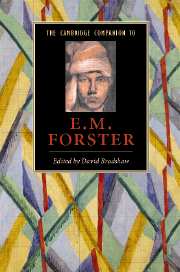Book contents
- Frontmatter
- Introduction
- 1 Forster’s life and life-writing
- 2 Bloomsbury and other values
- 3 Forster and England
- 4 Hellenism and the lure of Italy
- 5 Forster and the short story
- 6 Forster and the novel
- 7 Forsterian sexuality
- 8 Forster and women
- 9 A Room with a View
- 10 Howards End
- 11 Maurice
- 12 A Passage to India
- 13 Forster and modernism
- 14 Forster as literary critic
- 15 Filmed Forster
- 16 Postcolonial Forster
- Further reading
- Index
- Series List
Introduction
Published online by Cambridge University Press: 28 September 2007
- Frontmatter
- Introduction
- 1 Forster’s life and life-writing
- 2 Bloomsbury and other values
- 3 Forster and England
- 4 Hellenism and the lure of Italy
- 5 Forster and the short story
- 6 Forster and the novel
- 7 Forsterian sexuality
- 8 Forster and women
- 9 A Room with a View
- 10 Howards End
- 11 Maurice
- 12 A Passage to India
- 13 Forster and modernism
- 14 Forster as literary critic
- 15 Filmed Forster
- 16 Postcolonial Forster
- Further reading
- Index
- Series List
Summary
E. M. Forster's career as a novelist was spectacularly lopsided. Born in 1879, he published his first four novels in quick succession (Where Angels Fear to Tread (1905), The Longest Journey (1907), A Room with a View (1908) and Howards End (1910)), had largely finished what would eventually appear as Maurice by 1914, and published his most famous and ambitious novel, A Passage to India, ten years later (though it is worth mentioning that he started writing it in the wake of his 1912-13 visit to India and struggled to bring it to completion). Then, in the mid-1920s, with the plaudits of both reviewers and the wider reading public ringing in his ears, buoyant sales in both the United Kingdom and the United States, and two prestigious prizes for Passage on his mantelshelf, Forster the novelist shut up shop. His last is the only one of his six novels to be entirely set abroad and at the time it seemed to signal Forster's departure for new fictional horizons, yet in reality it marked his journey's end. He was only halfway through his life (he died in 1970) but he would never again be tempted to repeat Passage's extravagant success. 'I cant [sic] believe there will be anoth[er] novel', he told a correspondent around this time. 'The legs of my camera could not stand the strain.
However, while Forster the novelist retired prematurely, the professional man of letters remained as busy as ever, and in the long, anxious buildup to the Second World War (and the decades that followed it), he established an international reputation, through his essays, reviews, lectures, and broadcasts, as one of the most prominent, authoritative, and engaging public intellectuals of his day, an aspect of his career examined in depth by David Medalie in Chapter 2 of this volume.
- Type
- Chapter
- Information
- The Cambridge Companion to E. M. Forster , pp. 1 - 7Publisher: Cambridge University PressPrint publication year: 2007

